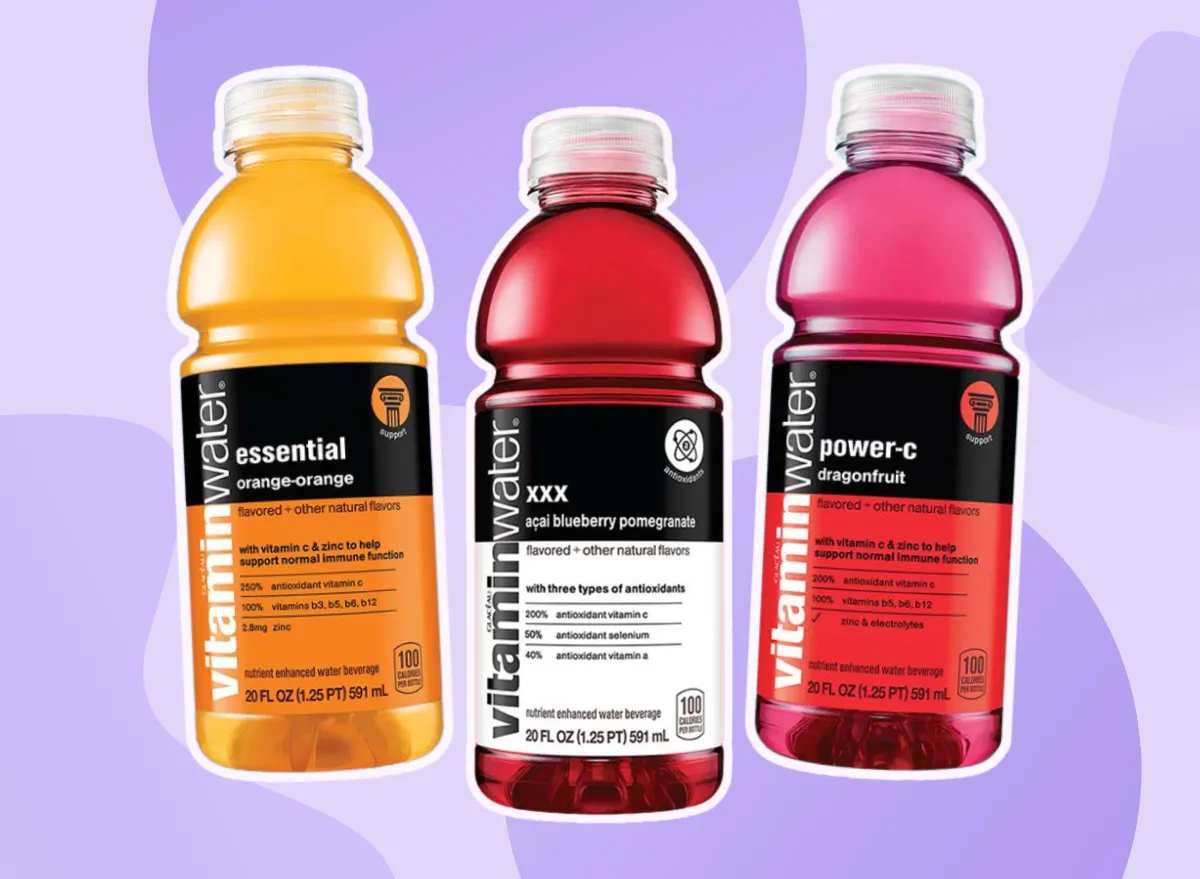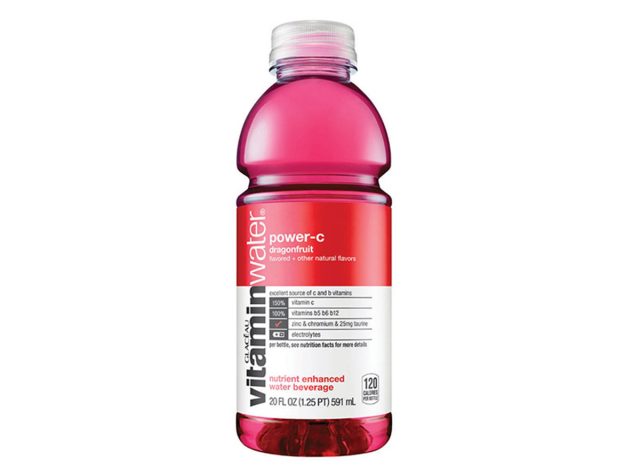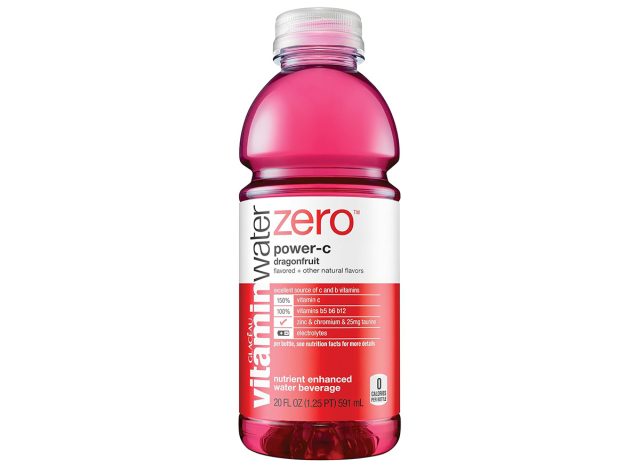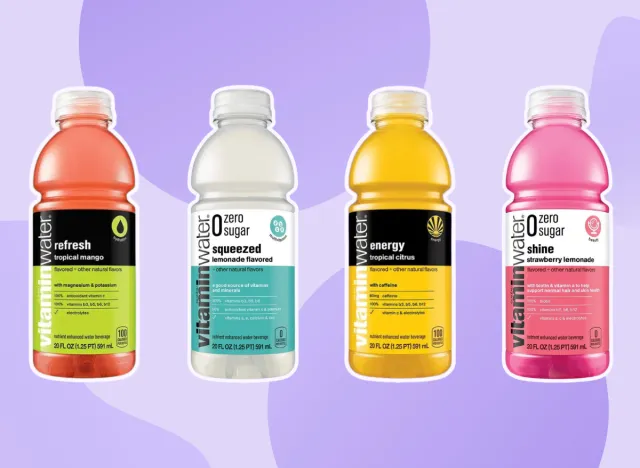Is Vitamin Water Good for You? We Asked a Dietitian

Like many wellness products, Vitamin Water's popularity has surged in the last decade. Marketed as a healthier alternative to traditional sugary drinks, it's often perceived as a healthy choice thanks to its vitamin and mineral content. This perception, taken with marketing campaigns and endorsements from celebrities like 50 Cent, has solidified Vitamin Water as a go-to beverage for people looking to boost their vitamin intake.
The main attraction of Vitamin Water lies in its promise of health benefits. Unlike conventional soft drinks, which often contain high-fructose corn syrup and empty calories, Vitamin Water's proponents claim it offers an array of essential nutrients. Flavored with various fruits and infused with vitamins, the drinks seem to be an easy and enjoyable way to boost your daily nutrient intake without the guilt associated with soda consumption.
But as its popularity rises, so do questions about its actual health benefits, and it's important to be aware of potential drawbacks. Read on to learn about Vitamin Water's ingredients and nutritional claims and whether or not you should reach for one the next time you're craving a cold beverage.
What Is Vitamin Water?
Vitamin Water is a flavored water beverage fortified with vitamins and minerals. While many different types are available, one of the most popular products is Glaceau Vitamin Water by Coca-Cola.
Vitamin Water is typically marketed as a healthier alternative to sodas and sports drinks, which may appeal to people looking for a convenient way to increase their nutrient intake while staying hydrated.
A key component of Vitamin Water is its vitamin and mineral content. While different flavors have different vitamins and minerals, some popular enhancements include vitamin C, B vitamins, and electrolytes like potassium and magnesium.
Another important aspect to consider is whether or not to choose the regular version or the sugar-free version. Many varieties of Vitamin Water contain added sugars, which can contribute to an increased calorie intake. However, some varieties, such as Shine Strawberry Lemonade, use natural sweeteners like monk fruit extract or stevia, offering an option for those watching their sugar intake.
Depending on the variety, Vitamin Water contains many different ingredients besides vitamins and minerals, including taurine, guarana, caffeine, and soluble corn fiber (a prebiotic fiber thought to promote the growth of good bacteria in the gut).
Nutritional Content of Vitamin Water
There are two types of Glaceau Vitamin Water: fruit-infused and zero-sugar flavored water with monk fruit and stevia. Since the two are quite different, we're providing nutritional information for both.

Calories: 100
Fat: 0 g (Saturated fat: 0 g)
Sodium: 0 mg
Carbs: 27 g (Fiber: 0 g, Sugar: 27 g)
Protein: 0 g
The regular version of Glaceau Vitamin Water contains 27 grams of added sugar. That's over half the daily limit of 50 grams recommended by the Dietary Guidelines for Americans. Considering that people may drink more than one bottle of Vitamin Water daily, the sugar can add up quickly.

Calories: 0
Fat: 0 g (Saturated fat: 0 g)
Sodium: 0 mg
Carbs: 0 g (Fiber: 0 g, Sugar: 0 g)
Protein: 0 g
The zero-sugar version of Vitamin Water appears to be a better choice for weight management compared to the full-sugar version, as it doesn't contain empty calories.
Health Benefits of Vitamin Water
There are several potential benefits of Vitamin Water.
Hydrating
There's no denying that Vitamin Water can be an effective way to hydrate due to its water base. For people who don't enjoy the flavor of plain water, Vitamin Water is a fun and flavorful way to increase fluid intake.
Provides Dietary Supplementation
Thanks to its fortification with vitamins and minerals, Vitamin Water may help fill dietary gaps when consumed as part of a well-rounded diet. Many types of Vitamin Water contain vitamin C, a powerful antioxidant that helps protect cells from damage. Depending on the variety, some Vitamin Water contains other antioxidants.
Energy Boost
Some people may also find they get an energy boost from Vitamin Water, which often contains the B vitamins involved in energy metabolism. A few varieties of Vitamin Water also contain caffeine, which can offer an additional energy boost.
Post-Exercise Benefits
Vitamin water may provide more benefits if consumed during or after intense physical activity when the body needs to replenish lost electrolytes, glucose, and fluids.
Health Drawbacks of Vitamin Water
Despite its marketing as a healthier alternative to traditional soda, Vitamin Water has several drawbacks to be aware of.
High in Sugar
Many varieties of Vitamin Water contain significant amounts of added sugar that rival those found in traditional sodas.
For example, a typical 20-ounce bottle of Vitamin Water can contain close to 30 grams of added sugar. That's more than half the recommended daily limit of 50 grams per day. While there's nothing wrong with the occasional indulgence, regular consumption of excess added sugar can contribute to the development of metabolic diseases like type 2 diabetes—not to mention significantly increase your risk of cavities.
Potential for Overconsumption of Vitamins
Another potential issue is the vitamin content. While it may seem like a healthy choice to get additional vitamins from your beverage, overconsumption of certain vitamins and minerals can cause problems, especially for people with kidney issues. For example, several varieties of Vitamin Water contain electrolytes like potassium. While excessive potassium consumption isn't typically a concern for most people, it can be dangerous for people with kidney disease, especially if consumed in excess.
Other varieties of Vitamin Water contain more than 300% of the daily recommended intake of certain vitamins, such as B vitamins. Considering that some people may be drinking multiple bottles of Vitamin Water daily, intake of certain vitamins well above recommendations is possible. While this may not necessarily cause issues—excess B vitamins are excreted in the urine—spending money on something your body doesn't need may not be the best choice.
RELATED: Is Carbonated Water Bad for You? 8 Side Effects of Drinking It
Risk of Dietary Imbalance
Relying on Vitamin Water for nutrient intake can lead to dietary imbalance. Whole foods like fruits, vegetables, whole grains, and lean proteins provide not only vitamins and minerals but also fiber, antioxidants, and other nutrients that work together to support overall health. By substituting these whole foods with Vitamin Water, you may miss out on the nutritional benefits of whole foods.
Is Vitamin Water Good for You?

Overall, while Vitamin Water can provide a convenient source of hydration and added vitamins, its health benefits are often overshadowed by high added sugar content and the potential risks of excessive vitamin intake if consuming more than one bottle daily.
To maximize health benefits, it's best to drink Vitamin Water in moderation and choose zero-sugar varieties when able.
If you're looking to hydrate naturally, consider infusing water with fruits, vegetables, or herbs to add flavor without the added sugar and calories. If you'd prefer a warm option, consider herbal teas. For those needing an electrolyte boost, try coconut water, which typically contains less sugar than Vitamin Water. Finally, for those looking for a fizzy option, try sparkling water with a splash of fruit juice as a low-sugar alternative to Vitamin Water.
- Source: Costabile, A., Deaville, E. R., Morales, A. M., & Gibson, G. R. (2016). Prebiotic potential of a Maize-Based soluble fibre and impact of dose on the human gut microbiota. PloS One, 11(1), e0144457. https://doi.org/10.1371/journal.pone.0144457
- Source: Macan, N. M., Kraljević, N. G., & Raić-Malić, N. (2019). Therapeutic perspective of vitamin C and its derivatives. Antioxidants, 8(8), 247. https://doi.org/10.3390/antiox8080247
- Source: Tardy, A., Pouteau, E., Marquez, D., Yilmaz, C., & Scholey, A. (2020). Vitamins and Minerals for energy, fatigue and Cognition: A Narrative review of the biochemical and Clinical evidence. Nutrients, 12(1), 228. https://doi.org/10.3390/nu12010228
- Source: Sami, W., Ansari, T., Butt, N. S., & Hamid, M. R. A. (2017). Effect of diet on type 2 diabetes mellitus: A review. International journal of health sciences, 11(2), 65–71.
- Source: Benahmed, A. G., Gasmi, A., Dadar, M., Arshad, M., & Bjørklund, G. (2021). The role of sugar-rich diet and salivary proteins in dental plaque formation and oral health. Journal of Oral Biosciences, 63(2), 134–141. https://doi.org/10.1016/j.job.2021.01.007
- Source: Yamada, S., & Inaba, M. (2021). Potassium Metabolism and Management in Patients with CKD. Nutrients, 13(6), 1751. https://doi.org/10.3390/nu13061751
- Source: Hanna, M., Jaqua, E., Nguyen, V., & Clay, J. (2022). B vitamins: Functions and uses in Medicine. the Permanente Journal/Permanente Journal, 26(2), 89–97. https://doi.org/10.7812/tpp/21.204









